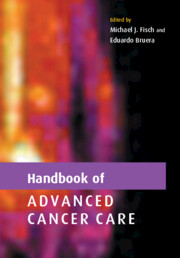Book contents
- Frontmatter
- Contents
- List of contributors
- Preface
- Acknowledgements
- PART I General concepts in oncology
- Part II Primary tumors
- 17 Lung cancer
- 18 Breast cancer
- 19 Colorectal cancer
- 20 Prostate cancer
- 21 Pancreatic and hepatobiliary cancer
- 22 Anal cancer
- 23 Esophageal and gastric cancer
- 24 Head and neck cancer
- 25 Kidney cancer
- 26 Bladder cancer
- 27 Ovarian cancer
- 28 Gynecologic malignancies: endometrial and cervical carcinoma
- 29 Testicular cancer
- 30 Unknown primary site cancer
- 31 Mesothelioma
- 32 Adult soft tissue sarcoma
- 33 Osteosarcoma and Ewing's sarcoma
- 34 Melanoma
- 35 Primary brain tumors
- 36 Thyroid and adrenal cancer
- 37 HIV-related cancer
- 38 Hodgkin's and non-Hodgkin's lymphoma
- 39 Leukemia, myelodysplastic syndrome and myeloproliferative disorder
- 40 Multiple myeloma
- Part III Management of specific symptoms and syndromes
- Index
- References
32 - Adult soft tissue sarcoma
Published online by Cambridge University Press: 04 August 2010
- Frontmatter
- Contents
- List of contributors
- Preface
- Acknowledgements
- PART I General concepts in oncology
- Part II Primary tumors
- 17 Lung cancer
- 18 Breast cancer
- 19 Colorectal cancer
- 20 Prostate cancer
- 21 Pancreatic and hepatobiliary cancer
- 22 Anal cancer
- 23 Esophageal and gastric cancer
- 24 Head and neck cancer
- 25 Kidney cancer
- 26 Bladder cancer
- 27 Ovarian cancer
- 28 Gynecologic malignancies: endometrial and cervical carcinoma
- 29 Testicular cancer
- 30 Unknown primary site cancer
- 31 Mesothelioma
- 32 Adult soft tissue sarcoma
- 33 Osteosarcoma and Ewing's sarcoma
- 34 Melanoma
- 35 Primary brain tumors
- 36 Thyroid and adrenal cancer
- 37 HIV-related cancer
- 38 Hodgkin's and non-Hodgkin's lymphoma
- 39 Leukemia, myelodysplastic syndrome and myeloproliferative disorder
- 40 Multiple myeloma
- Part III Management of specific symptoms and syndromes
- Index
- References
Summary
Incidence and demographics
Soft tissue sarcomas are tumors of mesenchymal origin that include muscle, cartilage, endothelium, and supporting structures. They are extremely rare and represent only 1% of all adult malignancies. The incidence is 1.5 per 100 000 population or 8000 new cases per year in the US. The incidence and mortality of soft tissue sarcomas in the US has not changed in the last 10 years. There is a slight male predominance of 1.1:1.0. The majority of adult soft tissue sarcomas occur in patients 50 years or older (51.8%), while 20% occur in patients 40–60 years old and 20% occur in patients less than 40 years old. They can arise anywhere in the body including the viscera, breast, vascular, and genitourinary system. Approximately 50% occur in the extremities, 40% in the trunk and retroperitoneum, and 10% in the head and neck.
Etiology
The etiology of soft tissue sarcoma is unknown. Multiple genetic and environmental factors have been implicated and studied. Specific genetic syndromes that are associated with increased risk of developing soft tissue sarcomas include neurofibromatosis, familial polyposis, Gardner's syndrome and Li–Fraumeni syndrome. Recognized associations exist between sarcoma and radiation exposure. Approximately 5% of newly diagnosed sarcomas are associated with a history of prior radiation. Patients who have undergone previous radiation therapy are at increased risk of developing sarcomas in the field of radiation exposure. The latency period between exposure and development of sarcoma is typically greater than 10 years.
- Type
- Chapter
- Information
- Handbook of Advanced Cancer Care , pp. 267 - 270Publisher: Cambridge University PressPrint publication year: 2003



